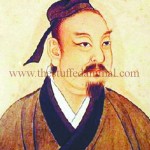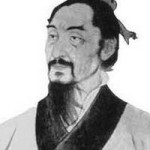Mo Tzu (470B.C.-391 B.C.) is a curious figure among the early giants of Chinese thought. Unlike most of the other names he is associated with (Confucius, Lao Tzu, Mencius, Chuang Tzu, etc.), Mo Tzu, born Mo Ti, seems to have been of low birth, possibly the son of a slave. He was a thoroughgoing eccentric, as famous for his dress and manners as his thought. He laid stress on the need for universal love, rather than love restricted to the family. He justified this in terms of the practical benefits it would bring, not least the prevention of social strife and war. However, by promoting the ideal of universal love, he despised Confucians with a passion, regarding them as uptight, egotistical, pretentious, upper class, and characterized by a mindless devotion to empty rituals and essentially denied the basic tenets of Confucianism, and therefore became a target for contumely in Confucian texts. This may have been exacerbated by the fact that Mo Tzu and his followers may have been poor; they certainly gave considerable thought to the plight of the poor in their teachings. In contrast, while the Confucians were humanists, they tended to be concerned with producing elite.Mo Tzu was noteworthy in his stress on the need for a proper methodology in setting up or accepting a doctrine. He argued that it should be tested by examining its basis, its verifiability, and its applicability. He used these tests to refute the doctrine of fatalism, arguing that the benefits of avoiding this doctrine would be the removal of poverty and loss of population, and the prevention of civil disorder. Along with Confucianism and Taoism, Mo Tzu’s philosophy was one of the three major Chinese philosophies that had been established by the third century BC.

 Zhang Qian—-the Pioneer of the Silk Road
Zhang Qian—-the Pioneer of the Silk Road 





Leave a Reply